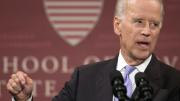Standing center stage at the Kennedy School Thursday evening, Vice President Joseph Biden’s message to the Harvard community was both concise and clear: as the United States faces a world in the midst of fundamental international change, it is crucial to form a global response with “more diverse players than ever before.”
“The international order that we painstakingly built after World War II and have defended over the last several decades is literally fraying at the seams,” he said. “The project of this administration is to update that order, to deal with these new realities, but also accommodate and continue to reflect on our enduring interests and our enduring values.”
Speaking to students, faculty, and staff for nearly an hour and a half, Biden touched on a range of foreign-policy issues, emphasizing the importance of maintaining core alliances around the globe while also combating health crises like Ebola and the violent extremism of terrorist groups such as the Islamic State (ISIL). He also stressed that maintaining a vibrant economy in the United States is the key to success in the twenty-first century. Referring to another domestic issue, he pointed out the need to pass immigration reform in order to build trust with countries in South and Central America. “It's one thing to say we respect the rest of the Americas, the majority of which are Hispanic,” Biden said. “It's another thing to say I respect them and yet not respect the immigrant population that's Hispanic here in the United States—it does not connect.”
Addressing Russian actions in Ukraine, Biden asserted that the Obama administration has found methods of dealing with Russian president Vladimir Putin without putting U.S. troops on the ground. Working with Europe, for example, on an energy plan so that Ukraine is not so dependent on Russia, he said, is crucial in this effort: “We’re working closely with Europe on everything from trade, to counter-terrorism, to climate change,” he stated. “It requires investment and sacrifice on both sides of the Atlantic.”
Meanwhile, building a solid relationship with China, Biden said, is one of the most essential efforts of the current administration, adding that the president will travel there later this year. “We want a deeper cooperation, not conflict,” he explained, adding that there are “no obvious impediments to building that relationship,” and the United States will “push back where we must,” specifically on human-rights issues.
Pandemic diseases like the Ebola crisis in Africa—where President Obama has recently sent 3,000 people as part of an international effort to combat the deadly virus—pose significant global-health challenges that need to be immediately addressed and contained, the vice president said. Another issue that must be faced head on, he said, is rapidly growing extremism in the Middle East, where the United States is now leading a campaign against the militants of the Islamic State.
Biden said the nation must counter the threat of ISIL not with boots on the ground, but by building a coalition and supporting opposition forces in Syria as well as Iraqi efforts to reestablish democracy and defend their territory. Although the threat posed by ISIL is real, Biden pointed out that it should be kept in perspective. The extremists do not represent “an existential threat to our way of life or our security…You are twice as likely to be struck by lighting as you are to be affected by a terrorist event in the United States.” Societies, he said, must solve their own problems, and changes brought on by the Arab Spring could take “a generation or more to work [themselves] out.”
“We didn’t crumble after 9/11. We didn’t falter after the Boston Marathon—we endure, we overcome, we own the finish line,” Biden declared. “This is going to require a lot of time and patience.”









